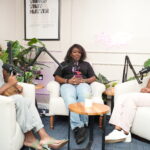By Destiny Uko
Scrolling through Instagram or watching reels on TikTok, you are sure to encounter selfies of young people adorned with filters. Perhaps you too have used them at some point.
Filters come in adorable shapes that add glow and magic to our pictures.
Face filters took off as beauty effects for pictures on Snapchat. They featured, among others, puppy ears, rainbows, flower crowns, and a pair of cool sunglasses. It meant that you were having a good time or feeling funky.
Today’s filters can edit your pictures in multiple ways: smooth your skin, slim your nose, line your eyebrows, give your lips a pinkish hue, make your eyes wide or narrow, and essentially give you a glow-up within seconds.
It’s become so rare for people to upload an unedited photo of themselves. 72% of plastic surgeons said people come in wanting to look like their filtered selfies, according to a 2021 study.
Another study from the Mental Health Foundation found that 1 in 4 teenagers feels unsatisfied about their appearance after seeing edited photos online.
Research has linked filters with psychological disorders such as anxiety, low self-esteem, lack of confidence, dissatisfaction and even depression. This is acute among teens and young adults who haven’t fully come to terms with their looks.
With their unrealistic beauty fixtures, many online filters blur the line between reality and simulation, stoking unhealthy crazes among social-media users.
Face filters are not entirely devilish, however. They can boost up your confidence where you feel dissatisfied with your bad hair or pimply face. A quick filter can mute those skin imperfections and get you ready for the camera.
Of more appeal is the creative edge, which allows you to be a cartoon, an alien, a fruit or even a slice of pizza. Filters can spruce up your background during a video call while helping you maintain a measure of light-heartedness
Should you use Face Filters?
Besides being fun, face filters can offer help sometimes. But do not let them define you or who you are. Use them to have fun, dine with creativity, or assist in your lighting but don’t let them convince you that your unfiltered face isn’t good enough.
If you’re using a filter because you’re playing around, good. If you’re using one because you’re afraid people will see a pimple, wrinkle or a spot, maybe you should take a second to ask yourself: Who really cares? (Real friends don’t actually.). If it’s about how you feel, then go ahead! But use it minimally.
Healthy Ways to Use Face Filters
Use Filters for Fun, Not Validation
Select filters that are fun or creative. You don’t have to look flawless in your pictures.
Be Honest When You’re Using One
Using a beauty filter is not about exposing yourself; it’s about keeping things real with your followers and friends. A simple caption like “This filter is out of this world!” or “This filter is my favourite” can make a big difference.
Balance Filtered and Unfiltered Posts
Make your timeline a mix of filtered and unfiltered pics to show both sides of your beauty.
Follow Accounts That Keep It Real
Follow content creators who typically post unfiltered content about body positivity. This association will help to shape your perceptions about keeping it real.
Set Personal Boundaries
Know when to use filters and when to go natural. For instance, you can decide to use filters for some of your reels as long as they don’t change the shape of your face.
Conclusion
Filters should feel more like accessories than masks. It’s totally cool to play with filters and have fun. Just don’t erase your real face in the process. Protect your identity.
Face filters, popularized by apps like Snapchat, have become ubiquitous on social media, allowing users to enhance their photos with various effects that can alter appearances in an instant. While they can serve fun and creative functions, such as turning users into cartoons or enhancing backgrounds in video calls, their overuse has raised concerns. Studies indicate that frequent use of beauty filters correlates with psychological issues like anxiety and low self-esteem, especially in teenagers who may feel dissatisfied with their natural appearance.
To use face filters healthily, it's recommended to choose them for fun rather than validation, being transparent about their use, and balancing filtered with unfiltered posts to embrace natural beauty. Following body-positive creators can also help shift perceptions towards authenticity. Overall, filters should be seen as accessories, not necessities, maintaining one's identity without overly relying on digital alterations.






